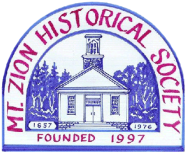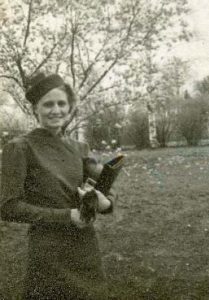
Bennett's Valley Physicians
Dr. Betty Hayes Voris
- Born May 7, 1912 in Jay Township, Elk County, Pennsylvania and died on June 26, 1984 in North Carolina.
Dr. Leo Zeno Hayes
- Born April 16 1878 and died December 20, 1942.

Dr. Betty Hayes: Courageous Valley Physician
By Patrick Watkavitch
MZHS 2009 Scholarship Award Winner
While the coal mining industry in Bennett’s Valley was thriving, living conditions for the workers were very insufficient. It wasn’t until 1945 when Dr. Betty Hayes Voris resigned as the physician for the Shawmut Mining Company that conditions began to improve.
Born May 7, 1912 Dr. Betty was a young, attractive, blonde doctor serving for both miners and other citizens of Bennett’s Valley. She was noted to be much like her father; Dr. Leo Z. Hayes who fought for improved conditions among miners during the 1900’s when the first railroads came through the Valley. Each of Dr. Betty’s brothers and sisters ended up following in their father’s footsteps and practiced medicine. While he was on his death bed, he was noted to state, “I hope you children won’t forget you were educated by the people of this Valley. I hope one of you stays on until the people get permanent medical attention.” Unlike the rest of her siblings that practiced in eastern cities, Dr. Betty worked as a resident physician in a Newfoundland hospital and then returned to Bennett’s Valley, fulfilling the final wishes of her father.
She first came to the area in 1942 (the year her father Dr Leo Hayes died) and was teased with prank calls from residents who thought it was funny to call out a young doctor on a dangerous night only to find that there was absolutely nothing wrong. After this happened a few times, Dr. Betty reported it to a committee of miners. A leader of the committee demanded that the tormenting stopped, otherwise there will be jaws broken. After this threat, she was never called out on a false alarm again. Aside from being the physician for the miners and their families, she also served the other citizens of the area, delivering babies, treating wounds, as well as other duties. On top of her responsibilities as a doctor, she was very dissatisfied with living conditions among the people in the Valley, so she became active in the fight to make changes. Eventually she resigned as the physician for the mining company, causing the beginning of a strike. Despite her resignation, Dr. Betty still continued to privately see about 4000 patients in the Valley including the miners.
Upon her resignation, she demanded the company to install water systems, sewage systems, indoor bathrooms, and foundations in company owned houses. In response, Shawmut stated that the improvements needed to meet her demands were too costly due to their current bankruptcy. Even with a portion of the miners’ medical cost money as a contribution, the project was still unable to be funded.
Dr. Betty continued to be distressed as people lived among overflowing outhouses, mud puddle streets, uncollected garbage, and polluted wells. In August 1945, many miners from Force wrote a letter to the United Mine Workers of American, saying, “Housing conditions and company houses of the Shawmut Mining Company in Force, Byrendale, and Hollywood are intolerable because of sewage in drinking water, yards, and highways. Please, in the name of humanity, call for the revision of contract with operators to compel companies to provide essential sanitary facilities.” After suspicions of a typhoid case, Dr. Betty had the wells inspected. The water was taken to the Brockway Testing labs where five of the seven wells tested were found to be contaminated by the outhouse drainage. After the data was reported to the state Department of Health, a sanitary engineer arrived, put chlorine into the wells, and told her to quit fussing.
Eventually, her resignation caused 750 miners to strike due to the poor conditions and the lack of a doctor on-call, a breach of their contract with the Shawmut. This caused an estimated loss of 700 tons of coal per day. Furthermore, the striking men tried to convince the Shawmut workers in Brandy Camp to leave their jobs to support the Force area miners and increase pressure on the company. The standoff caused the State Department and War Labor Board to examine the situation. After inspecting the town of Force, State Department Representative Leon Gavin considered the conditions to be “unhealthy, unsanitary and deplorable.” He also said that if conditions in other mining towns are similar to those in Force, it may be a good idea to examine, analyze, and correct them throughout the state. Gaining national attention, appeals were taken to both state and federal governments. From there, the controversy remained idle in the courts for three years (1945-1948).
Finally, conditions improved and the miners returned to work alongside Dr. Betty. New legislation was drafted, affecting thousands of miners and their families. Without the assistance and dedication of Dr. Betty Hayes, the conditions of the mining industry in Bennett’s Valley would not have improved.
"The Dying Doctor"
Lyrics by Woodie Guthrie
Woody Guthrie wrote several songs in support of the miners who were often in conflict with the companies which exploited them. These lyrics were written in September, 1945, but were never recorded. It is not known whether he ever wrote a tune to this or just intended it as a poem. As best known, nobody has performed this song before. Also known as The Company Town Doctor, it was published in the 1965 book Born To Win, which he co-wrote with Robert Shelton. The YouTube rendition by Raymond Crooke above has put a tune to it, which is close to Woody’s style.
E
Doctor Leo Hayes was our company doctor
B7 E B7
From the big coal companies he got his pay
E
For thirty-nine years he tried to cure us
B7 E
And now today on his deathbed lay.
A E
He called his five boys and his three daughters
A E B7
And at his bed we stood around
A E
We heard him tell the history of the coal miners
B7 E
And he said, “Don’t let these people down.”
Doctor Leo Hayes was our company doctor
From the big coal companies he got his pay
For thirty-nine years he tried to cure us
And now today on his deathbed lay.
He called his five boys and his three daughters
And at his bed we stood around
We heard him tell the history of the coal miners
And he said, “Don’t let these people down.”
You are all connected with the practice of medicine
You promise you’ll keep true I know
You will do your best to help these people
I close my eyes for I must go.
His youngest girl was Doctor Betty
With her face so pretty and her smile so sweet
She walked the coal towns of Force and Byrndale
She saw the sewage waters flowing down the street.
She saw the children drink the cankered water
She saw the chickens fly up on the roof
She saw the waters overflow the sewers
And flood their gardens of victory.
She went to the big shots of the Shawmut Company
She did not beg and she did not plead
She stood flatfooted and pounded the table
Sewer pipes and bathrooms are what we need.
My daddy told me to fight to cure sickness
But I can’t cure sickness with sewage all around
These germs kill people quicker than I can cure them
We need a foundation under every house.
We need a bathroom for every family
Yes, you can set there and blink your eyes
Three hundred miners are out behind me
We will clean this town or know the reason why.
I quit my job as the family doctor
I nailed up my shingle and went on my own
I carried my pillbag and waded those waters
I set by a deathbed in many a home.
I saw you catch rainwater in rusty washtubs
I saw you come home dirty up out of your pits
Watched you ride with your coffin up to your graveyard
With not a nickel to pay your burying debt.
On July the fifteenth from the hills around
Three hundred miners walked down through town
The state inspector was testing the water
While he was working you stood around.
One miner asked him to have a drink free
The inspector looked out toward our pits
He set his hat back on his head and says,
“I wouldn’t drink a drop of that on a bet.”
I think of my daddy and brothers and sisters
When we stood around his dying bed
When I walk the streets of the company towns
I can hear every word my daddy said.
The Shawmut Company is caught in its own paws
The people not worth the money they cost
A hundred have died, three hundred not working
Thirty thousand tons of coal is lost.
© 1965 (renewed) by Woody Guthrie Publications Inc.
Time Magazine Article-Medicine: Dr. Betty Cleans Up
Monday, December 24, 1945
The company doctor was a 33 -year-old woman, and good-looking; her name was Betty Hayes. Last July Dr. Hayes looked over the sanitary conditions in the company-owned mining villages of Force, Byrnedale and Hollywood, Pa., and decided that conditions were bad. The water had to be boiled before it could be used; sewage overflowed into yards and streets; the streets were mud bogs.
The state health officer told Dr. Hayes to wait until there was an epidemic before she made a formal complaint. The Shawmut Mining Co. said they could do nothing: they had been in receivership since 1905 and in another six years the mines would be worked out and abandoned. But her father had doctored the 400-odd miners and their families for 40 years before her time and she felt responsible for them. Dr. Betty resigned.
The miners struck in sympathy; they wanted Dr. Betty back. During the long deadlock, which lasted all summer and fall, Dr. Betty gave emergency medical care. The mine operators, who were losing a lot of money (probably enough, says Dr. Betty, to have cleaned up the sewage), locked up Dr. Betty’s office, on which she had paid the rent, took out some of her medical supplies and books and put a policeman at the door to keep her out. She haled the mine managers into court.
At this point, Federal Judge Guy K. Bard, who has jurisdiction over the receivers, stepped in. The judge made a visit to the towns to look and sniff for himself.